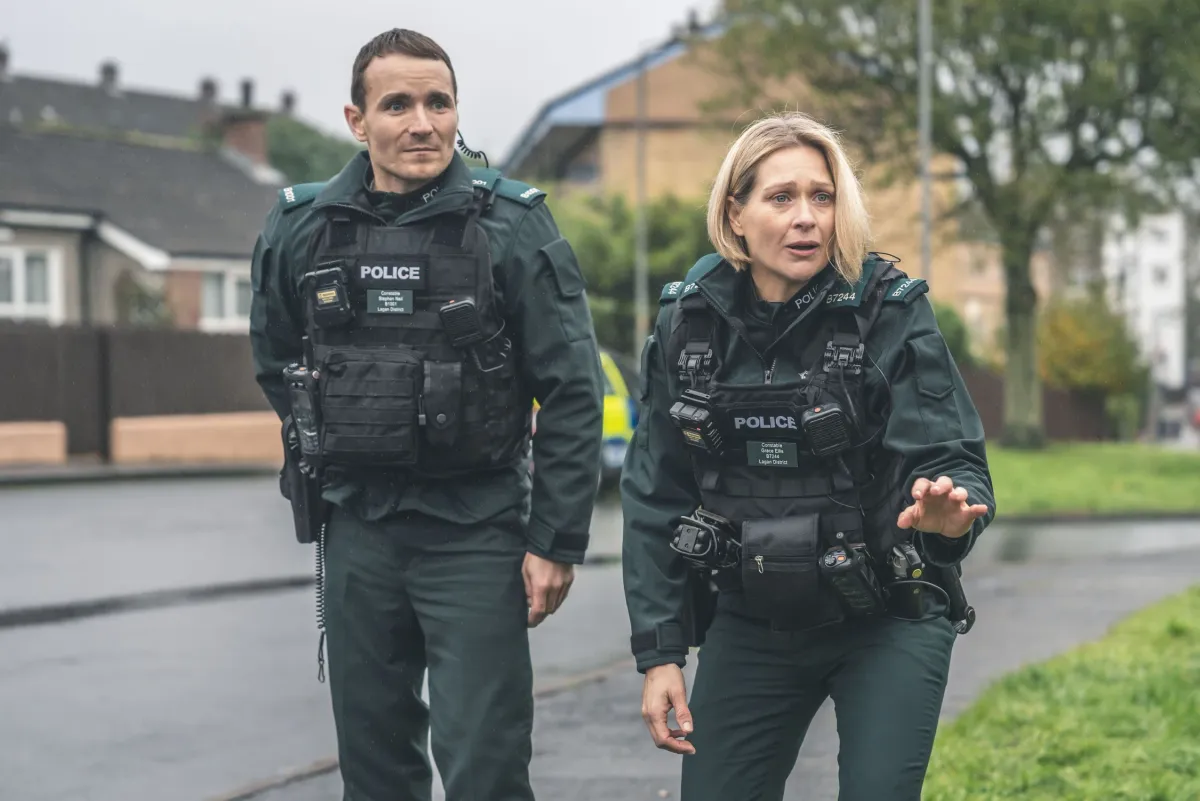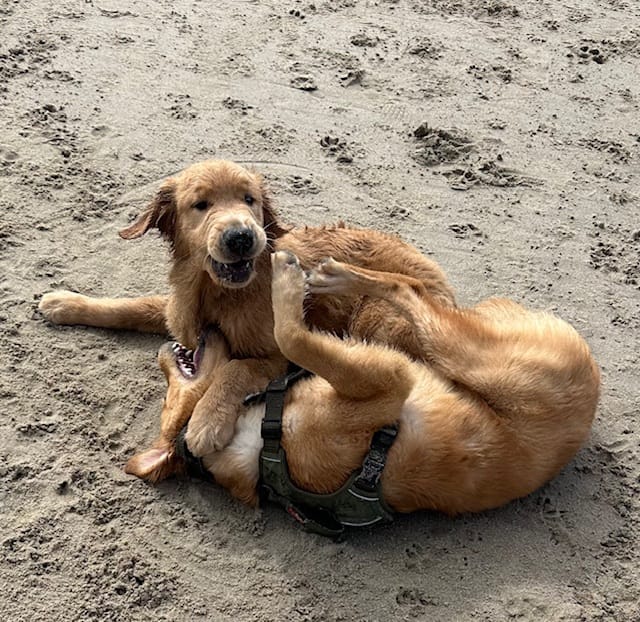I'm So Bored With the Bourgeoisie (i.e., A Tout for "Blue Lights")

No, I haven’t gone Marxist and abandoned the corporate capitalism model that’s made us all so happy.
After all, we boast the world’s most onerous income inequality.
And we’re looking at the potential election of a porcine thug who blithely lies, cheats, sexually assaults women and who, should he win, will endeavor to strong-arm his idiot-stuffed Supreme Court to make him President for Life. What could go wrong?
In due course, I’ll state how I really feel.
But yes, I’ve got a streaming show to heartily recommend. It’s called “Blue Lights” and is found on Britbox, viewable via the usual free week offered to lure you in.
But first, a brief aside.
Now that I have dutifully watched Episode 8 of “Presumed Innocent,” the David E. Kelley, AppleTV+ crime drama that stretched the story of the 1990 cult film across eight weekly episodes, I can step away from the doings we saw in the Rusty Sabich family’s rather luxe suburban manse.
Many reviews have been unkind, finding the series’ Big Reveal to be head-scratchingly annoying (or in Time online, “shoddy”). No argument here, but per the above headline, why do we invest such fascination into the various agonies of what Mr. Marx called the “haute bourgeoisie?”
They’re a highly visible sub-group of wealthy super-citizens who, thanks to their wealth and social rank and surfeit of the goods, services and power that is sparingly granted the rest of us, seem to have no problems smaller than murder. (The most eager aspirants to such status he termed the “petit bourgeoisie,” a group in which I admit– seek?--provisional membership).
I’ll just say it—in the face of the globe and the nation’s more urgent problems, I at present just can’t care about the woes of Jake Gyllenhaal’s accused-of-murder Rusty, Nicole Kidman’s anguished therapist in Kelley’s “The Undoing”, the cruel fate of Kidman’s Celeste in Kelley’s “Big Little Lies,” her troubled expat in “Expats,” and more recently, the troubles of such televised sufferers as…Fleischman.
Nothing against Ms. Kidman—they call her the queen of the Prestige Series because she’s so good at it. I met her once briefly and she’s smart, funny, a little bawdy. Her philanthropic works are well documented, most notably for the United Nations Development Fund for Women. (Though when we watch those languorous, lustrous ads touting the big screen experience to be had at AMC cinemas, are we meant to feel enticed, or… scolded just a little?)
It's the very difficulty of getting fannies in cinema seats (even with the recliners and drab cheeseburgers available) that is of course front of mind for actors like Kidman and an entire exhibition business that was once fed by the sort of films Kidman once made. (I suppose it’s completely idle to ask for the next Kubrick to come along with the next “Eyes Wide Shut”?)
Until those prospects improve, I’ll seek out fare made for the small screen, in search of something grittier, more authentically involved in real lives lived below both the haute and petit bourgeoisie, something in touch with what Karl called the “proletariat”.
Which brings us to the tout promised above. What better place to unearth real life, in both its quotidian difficulty and its occasional alarums, than in the mean streets of Belfast?
There will be room in this newsletter for deeper consideration of “Blue Lights,” as the show in question was recently granted seasons three and four by the BBC and various co-producers, but for now, the two seasons we have may answer the bell for those wanting a bit more societal consequence in their entertainment.
The series was created despite the travails and interruptions of the pandemic,. It was conceived and executed by a pair of multi-talented reporting veterans, Declan Lawn and Adam Patterson. Their shared creative upbringing centers on of the Beeb’s prestigious current affairs series, “Panorama.,” The added authenticity derives from their own lives coming of age in Belfast with real-life lessons learned from crisis scenarios such as they chronicled in their global reportorial travels.
If you check out the series, prepare to spend a good deal of time eavesdropping on various two-officer teams in patrol cars (though also in paramilitary truck rigs with similarly giddy paint jobs and squads with assault rifles. Irish cops carry guns).
Skipping from incident to accident to difficult love matches (too much of those for some reviewers), the Northern Irish police procedural is by turns tense and touching, at times etched in blood, at times sweet-tempered. What the key cast and showrunners have done with all this has the characters still living in my head a week after a two-season, twelve-episode binge. The series' first two seasons piled up an array of nominations (Best Drama, Script, Actor and Supporting Actor from the Irish Film and Television awards), and racked up raves from various Irish and British critics, including cautious comparisons to the Yank crime series paragon "The Wire." The Guardian found the second season welcome: "Last year's breakout police hit is as beautifully tense as ever...it has a clear-eyed, human view of policing as an impossible job." The Times of London cited "a streak of outraged social politics at its core."
In precis, the show quickly plants us in a bustling police station that, while part of a Belfast that’s fully aware of the sectarian residue of The Troubles, concentrates not on the Catholic, IRA-adjacent separatist/republican population but on the Protestant “loyalists”, the most fervent of whom also carry guns and are engaged in a territorial war over lucrative if dangerous drug-dealing schemes.
The cops we meet and follow, three of them serving in particular as the avenue to plenty of funny and tragicomic street (and working-class household) stories, must navigate their own nascent careers through the thorny chains of command that are soon hinted to be overzealous, and in spots fatally corrupt.
As a stark reminder of “What could go wrong?” (the sardonic phrase is heard to good satirical effect several times), the series arrived on BBC One in 2022 following the real-life attempted murder of John Caldwell, an off-duty police officer who had media duties covering both dissident republican violence and crime gang murders.
Our three provisional recruits to the hard lessons of face-to-face policing as each is thrust into nerve-wracking scenarios. Annie Collin (played by Katherine Devlin, who is such a stunning example of an Irish rose that the screenwriters let a detained suspect remark on it) gets to land in a punch in Season Two that—if you’ve gone down the blue-lit rabbit hole as I have with these cops—may make you punch the air yourself.
A second probationary officer, Tommy Foster, is relatively clueless but has the luck to be paired with the unit’s grizzled, wisecracking veteran Gerry (Richard Dormer won Best Actor from the Irish TV awards for the role) and we watch him avidly.
But if Gerry is the charismatic policing shaman of the crowd, Sian Brooke’s Grace Ellis is the show’s centerpiece. Brooke is a Royal Academy of Dramatic Arts grad who played Ophelia to Benedict Cumberbatch’s Hamlet on the West End. If these patrol (or “response”) cops are mostly yielding with the local population in their haywire schemes and slip-ups, Grace, a former social worker, is keenest of them all in facing danger and complications.
Her patrol partner Stevie (Martin McCann was nominated by IFTA as a Supporting Actor) is a rough-hewn sidewalk (or riot-scene) philosopher, deeply caring like Grace but hyper-aware of the danger that can bring. We watch amused as they trade snacks and song choices (The Isleys’ version of “Love the One You’re With” plays under an actor’s clinic of smothered grins) and at one stage as Grace proposes a daringly considerate move, he gives her a fond but worry-hedged gaze: “You’re a good person trying to help, what’s the worst that could happen?”
In the tumultuous world of “Blue Lights,” this is the sort of warning that brings flocks of strobing blue lights, and sirens as well, but in the topsy-turvy world of these two seasons, the phrase also conveys the sense that our squad of armored and armed, overworked and undercut, fiercely loyal “bobbies” will have each other’s backs.


Comments ()